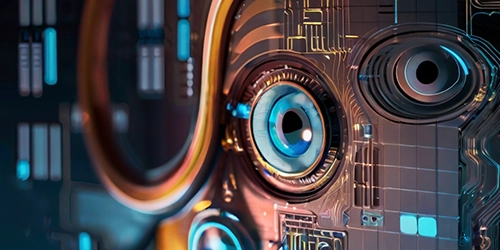A revolution is unfolding. It’s not heralded by blaring trumpets or grand proclamations but by the subtle, almost imperceptible ways it weaves into the fabric of our everyday lives. This revolution is powered by Artificial Intelligence (AI)—a force so pervasive yet so stealthy that many of us hardly notice its presence. Yet, its impact is profound, reshaping everything from how we work and learn to how we entertain ourselves and interact with the world.
Once a lofty concept confined to science fiction, AI has become an integral part of our daily reality. Its rapid advancement, fueled by vast data volumes, powerful computing hardware and software, and innovative algorithms, has catapulted it from the research labs into our homes and workplaces. This article delves into the essence of AI, exploring its mechanisms, benefits, and challenges and painting a vivid picture of its current and future applications in our everyday lives.
Understanding the Mechanics of AI
AI operates through sophisticated algorithms and models that learn from data, improving performance without explicit programming. It exists in two forms: narrow and general. Narrow AI, already a part of our daily lives, handles specific tasks like chess, facial recognition, or language translation. General AI, a more ambitious yet unrealized goal, aims to perform any intellectual task a human can, including understanding natural language and exhibiting emotional intelligence. AI can also be categorized as symbolic, dealing with knowledge representation and processing, and sub-symbolic, focusing on modeling complex systems through data and pattern learning.
The Pervasive Influence of AI in Daily Life
- Industry and Commerce: AI has revolutionized industries by optimizing production processes, enhancing product design, and personalizing customer experiences. In commerce, it’s reshaping marketing strategies and customer service through predictive analytics and chatbots.
- Banking and Finance: AI’s role in fraud detection, algorithmic trading, and personalized financial advice has transformed the banking and finance sector, offering more security and tailored services to customers.
- Education and Learning: AI-driven personalized learning platforms are revolutionizing education. They adapt to individual learning styles and pacing and provide educators with valuable insights into student performance.
- Entertainment and Media: From AI-curated playlists to personalized content recommendations, AI is changing how we consume media and entertainment, making it more tailored to our preferences.
- Healthcare and Medicine: AI’s impact on healthcare is significant, from diagnostic tools and treatment planning to drug discovery and patient care management.
- Smart Homes and Cities: AI is at the heart of smart home technologies and the development of smart cities, enhancing energy efficiency, security, and overall quality of life.
Challenges and Ethical Considerations
While AI brings numerous benefits, it also poses challenges and ethical dilemmas. Issues like privacy concerns, the potential for bias in AI algorithms, and the impact on employment and job markets are at the forefront of discussions. Balancing the advantages of AI with these concerns is crucial for its responsible and beneficial integration into society.
AI’s role in our daily lives is both transformative and subtle. As we navigate this AI-infused world, staying informed and engaged with how this technology evolves and impacts various aspects of our lives is essential. Whether we’re embracing AI in our professional endeavors, leveraging it for personal growth, or debating its ethical implications, one thing is clear: AI is not just a fleeting trend but a fundamental shift in how we interact with the world.
Are you interested in exploring how AI can impact your business, event, or personal growth? Feel free to reach out for insights, discussions, or speaking engagements on this fascinating and ever-evolving topic.







